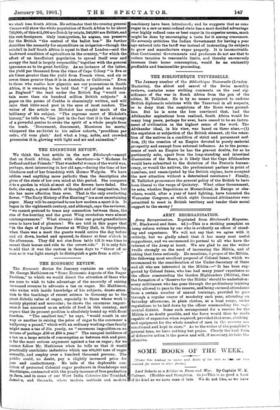THE ECONOMIC REVIEW.
The Economic Review for January contains an article by Mr. George Mathieson on " Some Economic Aspects of the Sugar Problem," to which we would direct the attention of those who are sure to wish to take advantage of the necessity of raising increased revenue to advocate a tax on sugar. Mr. Mathieson, who writes with inside knowledge of his subjects, draws atten- tion to the teachings of recent science in Germany as to the great dietetic value of sugar, especially to those whose work is mainly physical and muscular; he shows the enormous import- ance it has assumed as an article of food in this country, and argues that its present position is absolutely bound up with fiscal freedom. "The smallest tax," he says, "would result in one way or another in raising the price of sugar to the consumer a halfpenny a pound," which with an ordinary working-class family might mean a tax of 25s. yearly, an "enormous imposition on an income of perhaps .250 or 260 a year." The unequal incidence of a tax on a large article of consumption as between rich and poor, is far the most serious argument against a tax on sugar; for we cannot follow Mr. Mathieson when he tells us that it would Practically annihilate industries which use 404,000 tons of sugar annually, and employ over a hundred thousand persons. The public could, no doubt, pay a slightly increased price for 1ant and confectionery. He tells of the deplorable con- dition of protected Colonial sugar producers in Guadeloupe and Martinique, contrasted with the yearly increase of free production in Java, and in some of our West India Colonies like Trinidad, Jamaica, and Grenada, where modern methods and modern machinery have been introduced ; and he suggests that as cane sugar in a raw or semi-refined state has a most decided advantage over highly refined cane or beet sugar in its superior aroma, much might be done by encouraging a taste for it among consumers. He severely criticises the Indian Government for having a year ago entered into the tariff war instead of instructing its subjects to grow and manufacture sugar properly. It is inconceivable that Continental Governments and producers do not see that to reduce taxation to reasonable limits, and thereby enormously increase their home consumption, would be an eminently profitable and businesslike proceeding.


















































 Previous page
Previous page